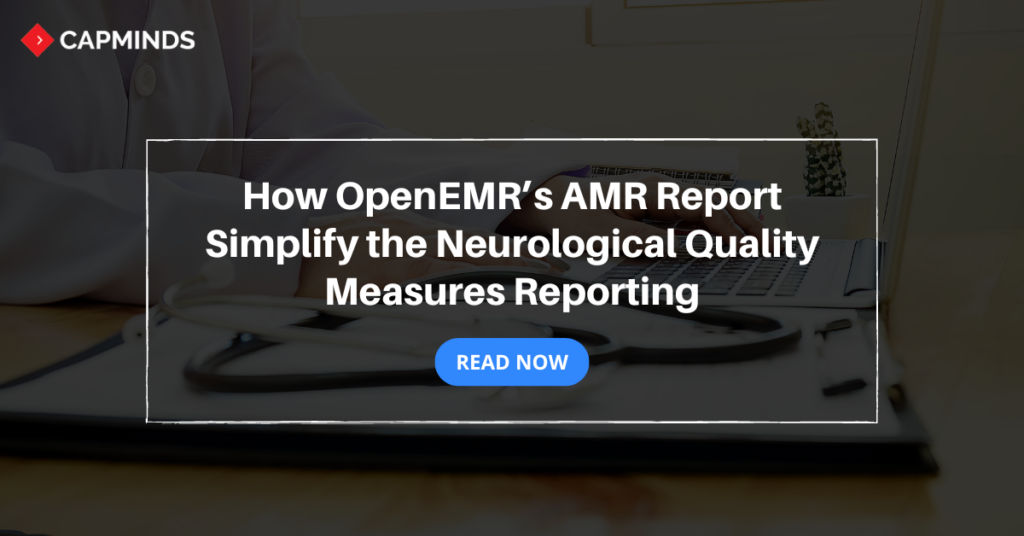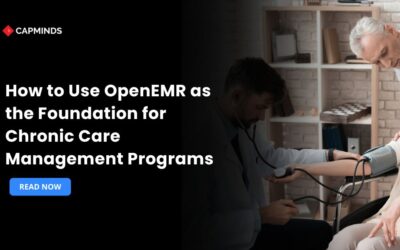How OpenEMR’s AMR Report Simplify the Neurological Quality Measures Reporting
In healthcare practices, the providers face difficulty in tracking the neurological quality measures reporting, to overcome this issue the OpenEMR’s AMC Report is a best-suite choice.
OpenEMR’s Automated Measure Calculation (AMC) Report, or AMR, is an efficient tool designed to streamline the process of reporting neurological quality measures.
By automating the calculation of these measures, it supports in reducing the amount of time and effort required by healthcare providers.
In this blog post, you can learn about how OpenEMR’s AMR report simplifies the neurological quality measures reporting and its benefits.
What are Neurological Quality Measures?
Neurological Quality Measures assess how well neurologists and health plans enhance population health and healthcare service delivery. These measures help healthcare providers access and improve the quality of care for patients with Neurological Conditions, ensuring that patients receive the best possible treatments.
OpenEMR AMC (Automated Measure Calculation) Reports
OpenEMR AMC (Automated Measure Calculation) Reports simplify the entire process by automating the calculation of Neurological Quality Measures.
It is used to provide patients with an electronic copy of their health information which includes Lab results, diagnostic test results, problem list, medication list, medication allergies, and more. This means that neurologists can effortlessly track the key metrics without the need for complex manual calculations.
Related: Custom Reporting Made Simple: An Example Guide to Building Reports in OpenEMR
Up-to-date problem list
- Ensure maintaining the patient’s up-to-date problem list of current and active diagnosis information.
- Enter at least one medical problem of the patient or “No Medical Problems” should be entered in the Patient reports.
- Easily track and manage patient conditions streamlines the healthcare process, and improves overall neurological care.
Medication List
- The Active medication list of the patient needs to be maintained in the OpenEMR’s AMC reports.
- Enter at least one active medication of the patient or “no medication” in the patient reports.
- Keeping a comprehensive medication list promotes medication safety and adherence.
Medication Allergy List
- Prioritize patient safety by utilizing OpenEMR’s AMC reports to maintain a detailed medication allergy list.
- Enter at least one patient’s medication allergy list or enter “No Allergies” should be entered in the patient reports.
- This Effective communication of allergy information minimizes the adverse reaction and ensures secure neurological care for patients.
Record and Chart Changes in vital Signs
- Monitor patient health seamlessly by recording and charting changes in vital signs.
- Ensure enter the necessary patient information like the patient’s weight, height, BP, and BMI are need to be entered for the patient.
- This ensures enhancing clinical decision-making with real-time data, providing a foundation for effective and personalized neurological care for patients.
Incorporate Clinical Lab Results
- The quality of neurological care can be enhanced by incorporating clinical lab results.
- Maintain the clinical lab results (Both electronically and manually) in OpenEMR as structured data.
- Accessing and analyzing the clinical lab data efficiently makes it easier to make more informed decision making.
Smoking status for Patients 13 years or older
- Documenting the smoking status of patients aged 13 or older promoted holistic care.
- Addressing this critical aspect supports comprehensive neurological care for patients.
Medication Reconciliation
- The Medication reconciliation process involves comparing the medication order that patients have taken.
- This process is done to prevent medication errors like omission, duplication, drug interactions, and dosage errors.
- Medication reconciliation needs to be done in which new medications are ordered or existing medication is rewritten.
E-prescription management
- Healthcare professionals should generate and transmit the prescriptions electronically.
- This e-prescription integration capability improves prescription accuracy, reduces callbacks, and streamlines the medication refilling process.
Patient-Specific Education Resources
- Empowering patients with tailored education resources based on their specific health conditions is necessary.
- This ensures active patient engagement by providing personalized information enabling making more informed decisions in neurological healthcare management.
Record Demographics
- The demographics of the patients need to be entered in the OpenEMR’s AMC reports. It is the foundation of a patient’s healthcare.
- Demographic Information including sex, language, race, ethnicity, and DOB.
Patients’ Follow-up care
- Sending automated reminders to patients’ preferences for preventive care.
- Optimizing patient follow-up care makes it easier for effective communication and coordination among the healthcare providers and patients.
- This encourages patients to participate in healthcare actively and ensures continuity of care for patients.
Providing Patients with Health information
- Utilize the OpenEMR’s AMC Reports to provide comprehensive health information to patients for enhanced patient education.
- This ensures patients actively participate in managing their neurological well-being.
Clinical Summary for Patients
- The Patient Summary needs to be provided for patients during every healthcare practice visit.
- Deliver a comprehensive and easily accessible summary that promotes transparency in healthcare and shared decision-making between neurologists and patients.
Related: Integration of OpenEMR and Live Time Tracker: Easing Patient Lives with Timely Care
Key benefits of using AMR for neurological quality measures:
Automation in Calculation
AMR automates the calculation of different neurological quality measures, it reduces the work of manual calculations, and eliminates the risk of errors.
Simplifies the Reporting Process
It has the ability to streamline the reporting process, which ensures healthcare providers focus on patient care rather than administrative tasks.
Accuracy in every process
AMR is responsible for accurate reporting, which is essential for compliance with regulatory requirements and to offer quality care to patients.
Supports in Compliance
It provides support to healthcare providers by complying with various quality reporting initiatives and regulations.
Challenges without the OpenEMR’s AMC Reports
Without the OpenEMR’s AMC reports, neurological healthcare practices have to face many challenges.
- Traditionally tracking all the necessary reports can be time-consuming.
- The Traditional method involves manual calculation which may be prone to errors.
- This process led to inefficiency and potential errors, diverting valuable time and resources from patient care.
Essential of Neurological Quality Measures
Neurological quality measures is a form of organized metrics used to analyze and enhance the quality of care to patients with neurological conditions.
These data-driven measures are essential for various reasons:
- To improve the quality of care
- It enables care across various healthcare providers and settings
- Supports in evidence-based practice
- Offers quality reporting and reimbursement in healthcare systems.
Stroke Care
These measures include the time to treatment for conditions like thrombolysis or mechanical thrombectomy, it follows evidence-based guidelines for stroke management, and functional outcomes after a stroke.
Epilepsy Care
It requires seizure frequency documentation, compliance to anti-epileptic medication, and the standard of life impacted by epilepsy.
Multiple Sclerosis
The main focus here is to measure the time to diagnosis, monitoring of disease progression, and level of patient satisfaction by healthcare providers.
Parkinson’s Disease (PD)
Parkinson’s disease measures consist of yearly review of the Parkinson’s disease diagnosis and assessment of psychiatric disorders or disturbances. Evaluation of cognitive impairment or dysfunction, and querying patients about falls.
Headache or Migraine
The process was the quality of life assessment for patients with primary headache disorders. It requires an amount of time for diagnosis.
These are some of the essential neurological quality measures. The specific measures implemented may vary depending on the healthcare setting and the specific neurological conditions being treated.
By tracking and reporting on these measures, healthcare providers can find out the areas for improvement and it results in high-quality patient care.
OpenEMR’s AMC Reports offers a simple and efficient solution for effortless tracking of the key neurological quality measures. With its comprehensive features and solutions, healthcare professionals can focus more on what matters the most – Efficient Patient Care.
CapMinds OpenEMR Service
CapMinds OpenEMR Service consigns with the best features and integrating modules. Our solution helps to make the healthcare specialty operation process much easier and improves efficiency.
- Our cost-effective solution benefits the healthcare practice of all sizes.
- CapMinds OpenEMR solution is specially customized with maximum accuracy for specific healthcare practice needs and requirements.
- We prioritize high-security data management that meets standards and ensures health compliance with industry regulations.
Experience the Next Level OpenEMR Service for efficient workflow. Connect with us and Let CapMinds assist you in meeting your specific healthcare practice needs.




